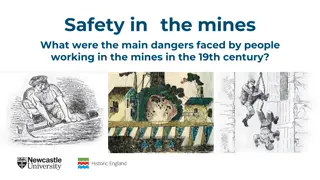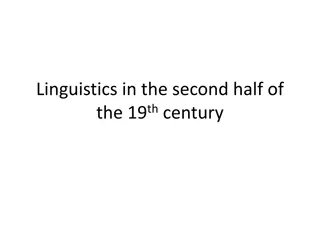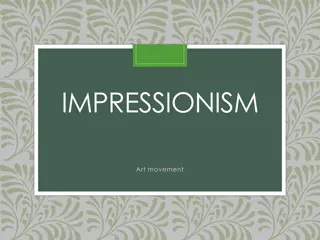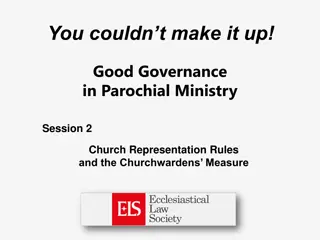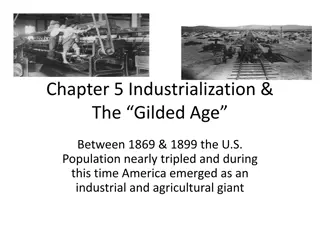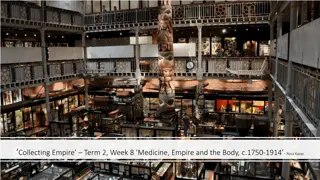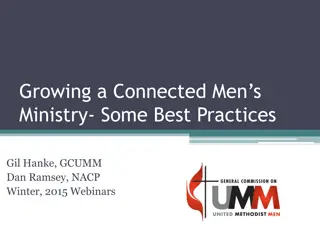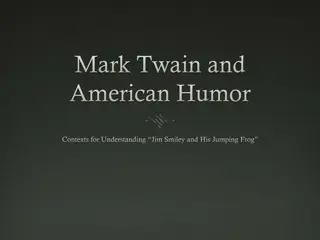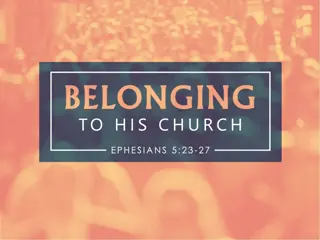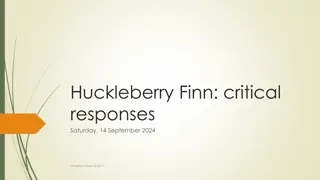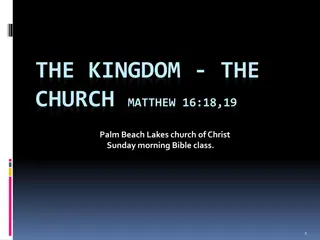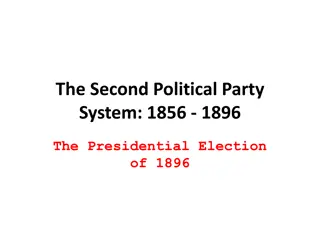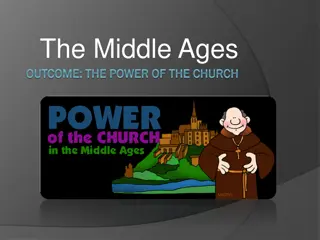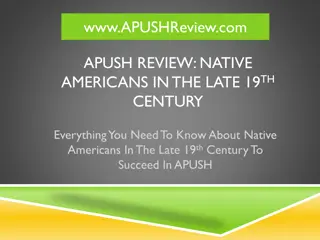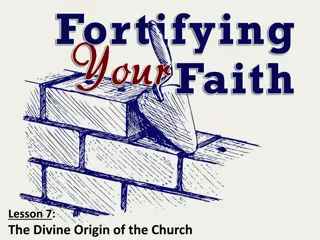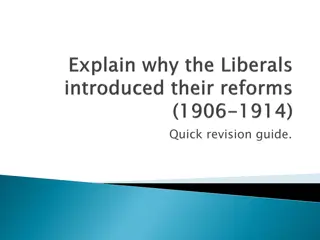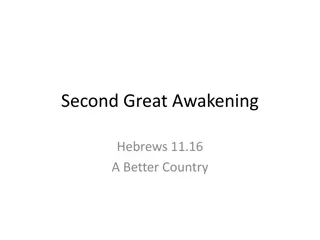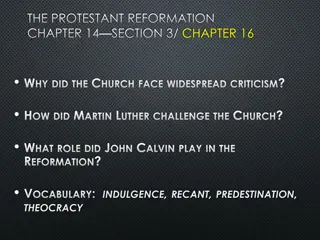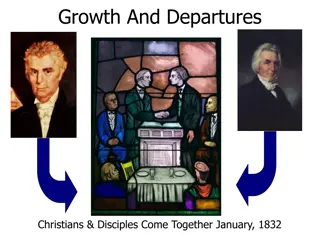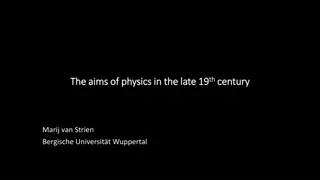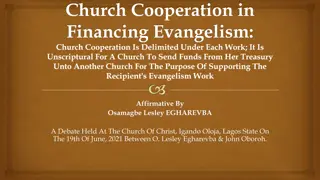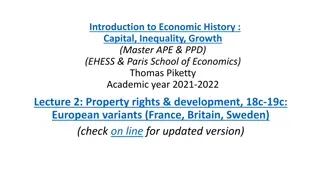Reform Efforts in the Ottoman Empire: 18th and 19th Century Transformations
The Ottoman Empire underwent a series of reforms from the late 18th to the 19th century, aiming to centralize power, boost revenues, strengthen the military, educate bureaucrats, refine legal systems, and improve healthcare. Factors driving these reforms included military weaknesses, separatist nati
0 views • 19 slides
Dangers Faced by Miners in 19th Century Mines
Mines in the 19th century were perilous workplaces with dangers such as flooding, getting trapped, poor ventilation leading to health issues, explosions from fire-damp, and the risk of being crushed. Tragic incidents like the Huskar pit disaster in 1838 and the New Hartley Colliery disaster in 1862
2 views • 9 slides
Linguistics in the Second Half of the 19th Century: Schleicher, Psycholinguistics, Neogrammarian Theories
August Schleicher's biological approach to language, including his Stammbaumtheorie, aligned with Darwinian ideas prevalent in the 19th century. The origins of psycholinguistics can be traced back to Heymann Steinthal, who advanced the psychology of language. This period saw critical developments in
4 views • 22 slides
Lost and Found: 19th Century Finnish Literature Exploration
Exploring the 19th-century Finnish literature through archives, bibliographies, and digital methods. Efforts to improve metadata, discover new knowledge about authors and works, and reconstruct the literary system disrupted by historical events like the Great Fire of Turku.
0 views • 12 slides
Understanding Impressionism: Art Movement in the 19th Century
Impressionism emerged in the mid-19th century as a reaction against traditional French art standards. This art movement focused on capturing the essence of a subject through short, thick strokes of paint and vibrant colors applied side-by-side. Artists like Claude Monet, Pierre-Auguste Renoir, and o
0 views • 11 slides
Good Governance in Parochial Ministry: Church Representation Rules and Churchwardens Measure
Explore the key legislation and the roles of Parochial Church Councils (PCCs) in promoting charitable objectives and supporting the mission of the Church. Understand the significance of Church Representation Rules, including the Electoral Roll and the Annual Parochial Church Meeting, emphasizing acc
0 views • 14 slides
The Impact of Industrialization and the Rise of Big Business in the Late 19th Century
The late 19th century saw significant industrial and economic growth in the United States, leading to the emergence of large corporations that dominated the economy and society. The Industrial Revolution spurred the development of interconnected transportation networks, electric power, and the appli
0 views • 21 slides
Evolution of Feminism Through Charlotte Perkins Gilman & Kate Chopin
First Wave Feminism focused on suffrage and legal rights in the 19th century. It later transitioned into the Second Wave critiquing patriarchal structures, with key figures like Betty Friedan and Gloria Steinem. Third-Wave Feminism emerged in the early 1990s addressing workplace harassment and power
6 views • 23 slides
Anthropological Collections and Display Practices in the 19th Century
Explore the practices of collecting and displaying anthropological artifacts in the 19th century, focusing on figures like Pitt Rivers and themes such as craniology, typological organization, and the construction of difference among human groups. The readings provide insights into how museums and ex
0 views • 5 slides
Empowering Men's Ministry in the Church: Best Practices and Insights
Explore the importance of men's ministry and scouting ministry, challenges in gaining universal clergy support, new realities facing men's ministry in today's church, unchanged fundamental needs of men for Christ, enlightening statistics on church attendance, and the role of men in church growth wit
0 views • 24 slides
Mark Twain and American Humor: Exploring Southwestern Humor and 19th-century Jokes
Delve into the roots of American humor through the works of Mark Twain, examining Southwestern humor from 1830-1860 characterized by tall tales and dialect humor. Discover the wit of women humorists like Frances Whicher and Marietta Holley. Explore humor forms like anecdotes, hoaxes, and frame tales
0 views • 17 slides
Evolutionary Contributions of Prominent Scientists in the 19th Century
Charles Darwin, Gregor Mendel, Friedrich Miescher, Aristotle, and Carl Linnaeus were key figures in the 19th century who made significant contributions to the fields of evolution, genetics, DNA discovery, and taxonomy. Darwin proposed the theory of evolution and natural selection, Mendel established
0 views • 20 slides
Understanding Christ's Church and Your Place in It
Explore the origins of Christ's church, how to become a part of it, and the significance of belonging to His church for eternal salvation. Discover the biblical steps to joining His church, serving faithfully, and the importance of commitment and dedication. Only through His church can one secure a
0 views • 7 slides
Supporters of Slavery in the 19th Century: Legal, Religious, and Economic Arguments
In the 19th century, defenders of slavery utilized legal arguments by denying citizenship rights to blacks, religious arguments by justifying ownership and guidance through biblical references, and economic arguments by comparing treatment of slaves in the South to conditions of workers in the North
0 views • 4 slides
Reception and Criticism of "Huckleberry Finn" in the 19th Century
Huckleberry Finn" faced a mix of reception in the 19th century, with some areas praising it while others criticized its language, humor, and moral tone. The book was banned in Concord but gained popularity in other regions, with critics highlighting its depiction of Southern life along the Mississip
0 views • 17 slides
Economic Transformations in Latin America during the Late 19th Century
The late 19th century in Latin America marked a period of significant economic changes driven by a global context that included events like the Great Depression of 1873-1896 and the second industrial revolution. Core capitalist powers sought cheap raw materials, labor, and new markets, leading to in
1 views • 17 slides
Understanding the Kingdom and the Church in Biblical Context
Many religious perspectives debate whether the Kingdom and the Church are one entity or separate. While some assert the Church is the Kingdom of God, others emphasize that they are distinct but interconnected. The concept of God's Kingdom ruling over the earth and the Church's role in proclaiming th
0 views • 31 slides
Political Landscape and Elections in the Late 19th Century
The political scene in the late 19th century in the United States was marked by the rise of the Second Party System, leading up to the pivotal Presidential Election of 1896. The Congressional elections of the era reflected shifts in power between Democrats, Republicans, and various opposition groups
0 views • 12 slides
Contrasting Perspectives of America in the 19th Century
The content delves into the societal, economic, and political disparities between the North and South of America in the mid-19th century, highlighting differences in literacy rates, economy, agricultural practices, and labor systems. While the regions shared a common history and political system, th
0 views • 36 slides
Unification of Italy in the 19th Century: Risorgimento Movement
The Unification of Italy in the 19th Century was driven by the Risorgimento nationalist movement, led by figures like Giuseppe Mazzini, Camillo Benso di Cavour, and Giuseppe Garibaldi. Cavour, as Chief Minister of Sardinia, played a crucial role in reorganizing the army and forming alliances to defe
1 views • 25 slides
The Temperance Movement in 19th Century America
The Temperance Movement emerged in the early 19th century in America, advocating for abstinence from alcohol due to its detrimental effects on health, families, and society. Led by figures like Lyman Beecher and Amelia Bloomer, the movement saw a decline in alcohol consumption, the implementation of
0 views • 8 slides
Insights into Italian Foreign Policy and Economy in the 19th Century
This content delves into the history of Italian foreign policy and trading policies between 1860 and 1960, focusing on the perceptions of Italy from abroad, the pre-unitarian inheritance of the Kingdom of Two Sicilies, and the societal and economic landscape of Naples and Sicily during the 19th cent
0 views • 30 slides
The Power of the Church in the Middle Ages
During the Middle Ages, the Church wielded significant power and influence. Christianity spread through missionary efforts and the Church became involved in politics, using its resources for various activities. Monasteries provided sanctuaries for monks and nuns devoted to serving God. The Church's
0 views • 7 slides
Dedicated Parishioners of Holy Name of Jesus Church - Profiles
Barbara and Bob Sheehy are deeply involved in the Holy Name of Jesus Church's 100th-anniversary celebrations and various fundraising events. Barbara has a background in fashion design and dental hygiene, while Bob has dedicated over 45 years to the same company and holds leadership roles in church s
0 views • 4 slides
Native Americans in the Late 19th Century: APUSH Review
Explore the systematic relocation, conflicts, and cultural assimilation of Native Americans during the late 19th century in America. From the Indian Removal Act to the Dawes Act, witness the impact of government policies on Native tribes, culminating in tragic events like the Sioux Wars and Wounded
0 views • 8 slides
Women and Philanthropy in the 19th Century: A Historical Perspective
This content explores the historiographical trends, gender dynamics, and the role of female philanthropists in the 19th century. It delves into how women engaged in charitable activities, challenging societal norms and contributing to the construction of women's identities through philanthropy. The
0 views • 23 slides
The Divine Origin of the Church: Unveiling Biblical Prophecies
Understanding the divine origin of the church is essential for grasping its significance. This lesson delves into the timeless purpose and prophetic foundations of the church, emphasizing its establishment according to God's eternal plan as foretold in the Old Testament by prophets like Daniel and I
0 views • 12 slides
Welfare Reforms in the 19th Century: A Historical Overview
In the 19th century, poverty was often blamed on individuals, leading to a laissez-faire approach by the government. Key figures like Charles Booth and Seebohm Rowntree conducted insightful studies on poverty, highlighting the need for welfare reforms. The emergence of genuine concern for the poor a
0 views • 8 slides
The Second Great Awakening: Revival and Transformation in 19th Century America
The Second Great Awakening was a significant religious movement in 19th century America, marked by fervent revivals led by influential preachers like James McGready and Charles Finney. Emphasizing sin, repentance, and spiritual renewal, this period witnessed a resurgence of evangelical Christianity
0 views • 14 slides
The Protestant Reformation and Its Impact on the Church
The Protestant Reformation was a period of religious upheaval in the 16th century, marked by criticism of the Roman Catholic Church's practices and beliefs. Martin Luther challenged the church by advocating salvation through faith alone and rejecting certain traditional practices. John Calvin emphas
0 views • 16 slides
Evolution of State Banking in 19th Century America
American economic development in the 19th century was driven by the abundance of resources and the necessity for capital-intensive projects. The expansion of the economy, adoption of technology, and integration into a national economy required a robust financial system with financial intermediaries
0 views • 19 slides
Historical Evolution of the Christian Church in the 19th Century
In the 19th century, the Christian church underwent significant changes and developments, encompassing growth, unity efforts, leadership transitions, and challenges such as the impact of the Civil War. Key events include the dissemination of the Disciples' Hymn Book, establishment of colleges, the i
0 views • 16 slides
U.S. Expansion and Foreign Policy in the Early 19th Century
The U.S. focused on increasing foreign trade, expanding its borders, and isolating itself from European conflicts during the early 19th century. Key events such as the Louisiana Purchase, annexation of Texas, and treaties with China shaped U.S. foreign policy. Debates over slavery, territorial expan
0 views • 7 slides
Evolution of Physics Goals in the Late 19th Century
Physicists in the late 19th century shifted towards modesty regarding the aims of physics, moving away from ontology and truth claims. The ideal of reduction to matter and motion was criticized, and determinism was seen as a regulative principle rather than a proven feature. The concept of descripti
0 views • 35 slides
The Work of the Local Church: Understanding Its Purpose and Function
Exploring the distinction between the universal church and the local church, this content delves into the organization, activities, and responsibilities of the local church in serving its members and community. Covering aspects such as worship, evangelism, edification, and benevolence, it emphasizes
0 views • 14 slides
Understanding Ordered Ministries: Roles and Responsibilities in Church Governance
Ordered ministries in the church, including presbyters, deacons, and elders, play vital roles in maintaining church life according to New Testament principles. This includes the election process and criteria for church nominating committees, as well as the defining characteristics and responsibiliti
0 views • 16 slides
Church Cooperation in Financing Evangelism: The Debate on Sending Funds
The debate at the Church of Christ in Lagos delves into the scriptural aspects of church cooperation and financing evangelism. It questions the practice of sending funds from one church's treasury to another for evangelism, citing Acts 11:27-30 and I Corinthians 16:1-3. The discussion explores the b
0 views • 28 slides
Embracing Membership in the Church: A Path to Spiritual Growth
Explore the significance of joining a church and how it can foster spiritual growth. Learn about the benefits of being part of a church community, the traits of exceptional members, and the importance of supporting the church's mission. Discover why Christians should actively participate in a church
0 views • 17 slides
Wealth Inequality and Property Rights in 19th Century Europe
The concentration of property in 19th-century Europe, particularly in France, saw a rise despite efforts to level wealth distribution post the French Revolution. Wealth inequality remained high throughout the Belle Epoque era, driven by modern financial assets and innovations. This period showcased
0 views • 33 slides
American Religious and Societal Changes in the 19th Century
During the 19th century in America, religious movements like Deism and Unitarianism challenged traditional beliefs, leading to reformations and awakenings. The Second Great Awakening spurred social reforms, while figures like Joseph Smith and Horace Mann influenced education and society. Issues like
0 views • 9 slides

